The Final Score Shows WEN Gets Results
By Jennie Rose, guest blogger
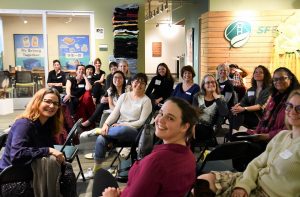
The mighty women of Hackathon 2.0. All photos courtesy of Sara Lanning.
Against the backdrop of an unfolding public health crisis, you might say WEN’s Hackathon 2.0 was a historic event. Hundreds of handwashings and perhaps even more Zoom calls later, we can see now how exceptional the timing was.
On an evening in early March, WEN members created a stack of cards, each containing a single concrete idea; some addressed new climate realities, others presented pathways to a more equitable society. A few bravely tackled the intersection of both. An hour later, we had over 50 handwritten ideas.
One particular insight seemed to inform both process and output from the 2.0 event—namely, the shared understanding that our problems at a personal level are not isolated, but rather linked to failings at a systemic level. In other words, “The personal is political.” This can explain why women tend not to put solutions in discrete, separate compartments. “The problems are never packaged in neat little compartments,” said WEN Board President Anya Deepak; why then would our responses to problems be compartmentalized?
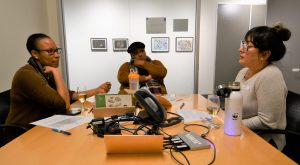
As a first-timer to the event, I expected a serious, somber atmosphere. How wrong I was. Picture crowdfunding at a live auction while on a chess timer. It was a controlled pandemonium. I was assured that my understanding would be much improved after the event. As I attempt to recap, you can be the judge of that.
The proceedings grew more spirited as the evening progressed. I plan to wear sneakers next time for quicker pivoting. First, under several headings such as Mentoring, Women-Centric Solutions, Community Engagement, Resource Access, and Lifting Each Other Up, groups formed for break-out sessions for a collective brain dump. This broke any ice that needed breaking. The casual, rapid style of brainstorming reduced social anxiety and mitigated the self-censorship that usually keeps (some of) us from blurting out ideas at a group level. Each idea that was discussed was then written down on a card. 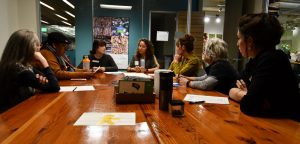
Next up, lightning rounds! The stack of cards was put into a basket, and we commenced to weaving around the room, pulling cards from the basket and ranking each idea on a scale of 1-5. Take the idea of “Start a ‘Feminist Fight Club’ book club.” This card was assessed by two members who together assigned a rating between 1 and 5, changed partners, then repeated the process with a new card from the stack and a different member.
On the one hand, lightning speed steered us away from using up precious time on deliberations. On the other hand, snap judgments don’t always produce state-of-the-art thinking. Small surprise then that a few ideas garnered a lukewarm response, and not nearly as interesting as the fact that our final cut from that night (linked below) shows dozens of hacks to a few of the more vexing problems that face women, girls, and female-identified people.
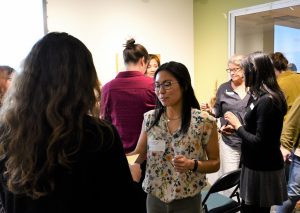 Each member was then asked to choose a favorite idea from the batch and commit to it for a few minutes daily. If I chose “Climate Change Engagement,” I would add a few minutes to my daily routine for this endeavor. I might start by establishing a cohort for a regular Zoom call. Such small actions gradually build to larger impact. It wouldn’t be too long before our group would see a collegial bond emerge, or quieter folks in the group would begin to speak up more.
Each member was then asked to choose a favorite idea from the batch and commit to it for a few minutes daily. If I chose “Climate Change Engagement,” I would add a few minutes to my daily routine for this endeavor. I might start by establishing a cohort for a regular Zoom call. Such small actions gradually build to larger impact. It wouldn’t be too long before our group would see a collegial bond emerge, or quieter folks in the group would begin to speak up more.
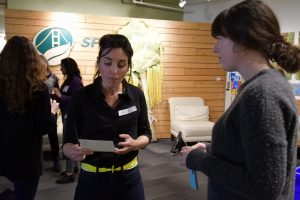
According to chaos theory, we can be sure that small actions carry enormous potential to create unpredictable effects. This is also true within capitalist patriarchy; actions of any size and any scope can potentially alter this system. We know this as the butterfly effect—the interdependent potential for a small variable to trigger a large change later on. I don’t know about you, but the metaphor of the butterfly works for me. Are you ready, wings? Start flappin’.
The list of ideas for transformative disruption: https://docs.google.com/spreadsheets/d/1M1RSsfU7i59D6ujPxPx87c1rlBun01TW69xyMmsocdw/edit#gid=0
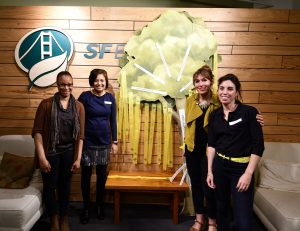
Soko Made and Anya Deepak, WEN board members and event co-leads, with Elodie Vidal and Kalie Granier, co-founders of WEN partner organization Loud Spring.
